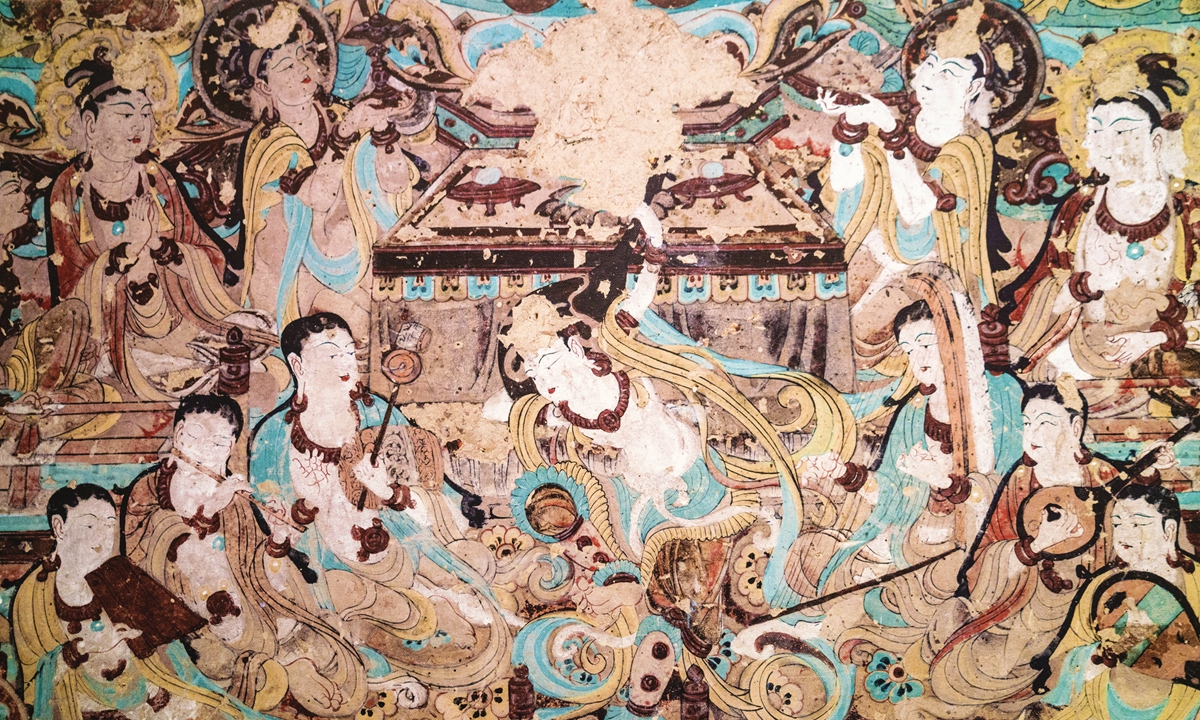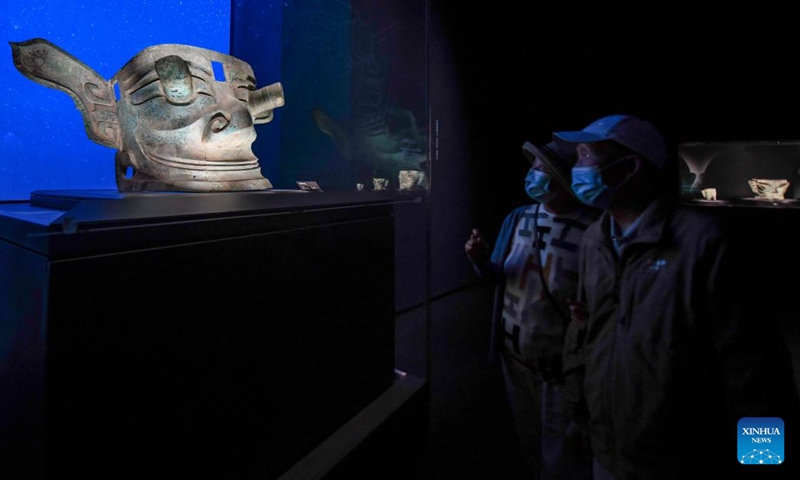
The mural of Mogao Grottoes in Dunhuang Photo: VCG
In the last decade, since the 18th National Congress of the Communist Party of China (CPC), China's archaeological research undertaking has developed by leaps and bounds. The country attaches great importance to archaeological research work and the tracing the origins of the Chinese civilization.
China has made stunning progress in archeology and cultural relic conservation in the past ten years, which is mostly thanks to the guidance of the CPC Central Committee which has paid high attention to the issue, Liu Zheng, a member of the China Cultural Relics Academy, told the Global Times.
Liu highlighted several achievements made in the past ten years, including a national research program dedicated to tracing the origins of Chinese civilization that increases the cultural confidence of the Chinese people, using high technologies to improve archeological works, and incorporating archeological development into the plan of national development.
"One of our advantages is that being able to concentrate our resources on major tasks, and the concerns of the Party and the central government in the field of cultural relics has helped solve many long-standing dilemmas," Liu noted.
Since 2012, the protection of cultural relics across the country has continued to improve. The first national survey of movable cultural relics and special surveys on grotto temples was completed. The number of national-level cultural relic protection units has increased by 115 percent, and eight new world cultural heritages have been approved, CCTV reported.
Major protection projects such as the Great Wall, the Grand Canal, the cultural heritage of the Silk Road, the cultural relics of the Three Gorges of the Yangtze River, and the key cultural relics in the Xizang Autonomous Region have also been completed.
Now China has 6,183 registered museums, among which 91 percent are free to the public to visit. Exhibitions in these museums have seen a 144 percent annual increase while visitor numbers has seen a 119 percent year-on-year increase. Some of the excellent exhibitions have become social topics, Jin Ruiguo, a senior official from the China's National Cultural Heritage Administration, said at a press conference in August.

People visit the Sanxingdui Museum in Guanghan, southwest China's Sichuan Province, May 16, 2022. In recent years, important archaeological discoveries from Sanxingdui Ruins site have driven the boom of the designing and sales of cultural and creative products in the Sanxingdui Museum.Products based on excavated cultural relics are popular among visiting tourists.(Photo: Xinhua)
More than 1,800 sets of cultural relics that had been lost overseas have been returned to the motherland. Efforts to search for and return lost cultural relics have seen some breakthroughs in recent years, making cultural relics a "golden calling card" to promote exchanges between countries, he noted.
According to Jin, in last several decades, China has put efforts to legislate the protection of cultural relics, with more than 200 local regulations being issued.
Meanwhile, the scientific and innovative studies on cultural relics have been significantly improved, and more talent has been fostered.
Liu gave compliments to Dunhuang Mogao Grottoes' digitalization development. He said that the digital products of Dunhuang art is one of the best methods to narrate Dunhuang's story that is a significant part of the Chinese story to those overseas as digital technologies can break limitations of space and time.
The digitalizing projects of Dunhuang also make cultural relics lost overseas be collected virtually and give chances to audiences to enjoy them, Liu added.
Moreover, speaking of the cultural creative industry, Liu pointed out that the industry is rapidly growing in China to meet more diverse needs of the public.
Xi Jinping, general secretary of the Communist Party of China (CPC) Central Committee, has stressed developing archaeology to better understand the long-standing and profound Chinese civilization.
China is undergoing an extensive and profound social transformation and is seeing great practices and innovations in upholding and developing socialism with Chinese characteristics, he said in September 2020, according to the Xinhua News Agency.
Xi called for attaching greater importance to archaeological research to deepen people's understanding of the Chinese civilization that features a long history and profoundness, thus providing strong support for the promotion of fine traditional culture and the strengthening of people's confidence in Chinese culture.
Archeological work is not only an important cultural undertaking but also has great social and political significance, he said, adding that historical and cultural heritages tell vivid stories from the past and profoundly influence the present and future.





